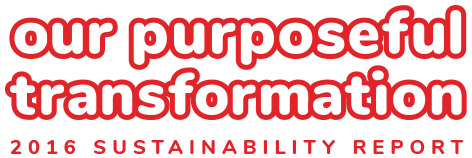natural resources
Multi-Use Plastics

There used to be an excess of scrap plastic in URC’s plant in Simlong, Batangas. Given that plastic can only be recycled a number of times, the build-up of waste material is inevitable. Recently, however, URC has found a way to not only reduce waste, but also gain from a market-ready product made of recycled scrap: plastic pallets.
...the Batangas plant is the only BOPP Plant in the Philippines that has an integrated management system with ISO certifications— ISO 9001:2008 Quality Management System and ISO 14001:2004 Environmental Management System.
MAKING THE BOPP FILM
Owned and managed by URC BOPP Packaging, the Batangas plant produces the plastic film materials used by the Company. Specifically, machinery converts resin material into Bi-axially Oriented Polypropylene (BOPP) films, which is used for the packaging of different consumer products, particularly food. BOPP is non-toxic, and resistant to ultraviolet (UV) light, acid, and mild chemicals, as well as heat — ideal material for storing and slowing the spoilage of food products.
In the process of converting the resin material into BOPP film roll form, the plant regularly generates scraps. These scraps undergo a recycling process that transforms them into re-granulated pellet resins or “regrinds”. Unfortunately, only a limited quantity of regrinds can be reused back into the mainline machine system, as it may affect the quality of the films. Regrinds can be sold "as is," but at a very low market price, or can be recycled.
UPCYCLING SCRAP PLASTIC
URC BOPP Packaging is constantly implementing improvements in the production process to measure and minimize scrap generation. In fact, the Batangas plant is the only BOPP Plant in the Philippines that has an integrated management system with ISO certifications — ISO 9001:2008 Quality Management System and ISO 14001:2004 Environmental Management System. Part of our waste management strategy is to find ways to utilize the net generated regrinds inventory, instead of selling it at a losing price.
In 2016, the business unit started to explore the use of regrinds into different plastic products. One result was a feasible plastic pallet tolling project, envisioned to serve the needs of URC affiliates using plastic pallets in their warehouse. This led to a partnership between URC BOPP Packaging and URC Branded Consumer Foods Group (BCFG) for the latter’s plastic pallet requirements used in various URC food products.
Plastic pallets are particularly useful in highly regulated and hygiene-sensitive industries such as food manufacturing. These pallets serve as a hygienic bed for merchandise when storing and shipping — minimizing contact with the floor or ground, forming an easy in and out of the truck bed or other conveyance, and reducing the risk of damage to the products. Compared to the traditional wooden pallet, the plastic pallet has the advantage because it is both lightweight and durable, easier to clean and unlikely to harbor bacteria, and made of one single piece with no nails or screws that could snag the product. Using plastic pallets also eliminates the risk of injuries from splintered wood or loose boards.
URC BOPP Packaging delivered its first batch of plastic pallets to URC BCFG plants in July 2016. There have been no major complaints regarding these products, and the deliveries continue to date.
SAVING THE ENVIRONMENT
We use every means to prudently and properly use, reuse, and dispose of our plastic materials, so as not to add to the already burgeoning solid waste problem in the Philippines. Minimizing scrap and extending the lifespan of plastic is eco-friendly, efficient, and cost-effective.
The BOPP plant was able to free up the warehouse space formerly occupied by the regrinds inventory for its BOPP film finished goods products, which are available to serve regular BOPP customer requirements.
We were able to find a better use for our scrap. Converting the regrinds into plastic pallets means they’re given a second life, with a new function of storing goods for transport and warehousing. Plastic pallets can be reused more times compared to wooden pallets. This means that fewer trees are cut down to create new wooden pallets; it also means that fewer wooden pallets end up in the landfill.
Given the success of the project, we have also offered these plastic pallets to other divisions of URC, and Robinsons Retail units such as Handyman and Robinsons Supermarket. We are now also developing a one-way (disposable) pallet to be used in export by URC Flour and Pasta Division.
Other featured articles in the section
A Wealth of Uses for URC Waste
As one URC, we have discovered that there is more than one way of tackling our waste disposal problems. Here, we present some of our creative solutions.


natural resources
Download the complete Natural Resources chapter:
Download Standard Quality[856 kb] Download High Quality
[3.79 mb]